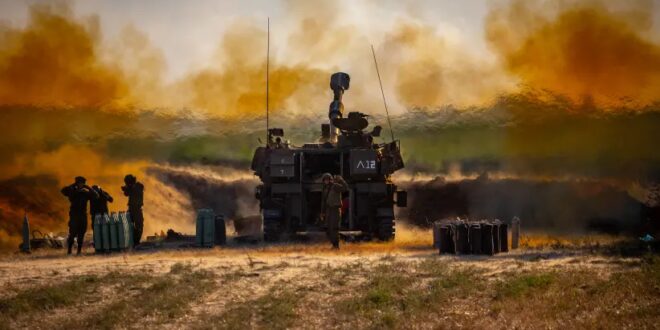Deterrence is “an elusive concept subject to the cruel judgment of the time,” IDF Chief of Staff Lt.-Gen. Aviv Kohavi said.
Operation Guardian of the Walls was not meant to overthrow Hamas, but to bring about deterrence by severely hitting the capabilities of the terrorist groups in the Gaza Strip, IDF Chief of Staff Lt.-Gen. Aviv Kohavi said Wednesday.
“Operation Guardian of the Walls was not intended to overthrow Hamas in the Gaza Strip but to use such military force that it would deprive Hamas and Palestinian Islamic Jihad of many of their capabilities,” said Kohavi, who was speaking at an event in memory of former IDF chief Amnon Lipkin-Shahak at the Interdisciplinary Center Herzliya.
And while the groups were struck by extreme force over the course of 11 days, Kohavi warned that “we need to be modest about what deterrent effect it will produce. The Six Day War was a sharp and smooth victory; but shortly after, the War of Attrition began.”
Deterrence is “an elusive concept subject to the cruel judgment of the time,” he continued, adding that it must be translated into “strategic and political achievements, and we have all said – the prime minister, defense minister – that whatever was will not be, both in our reactions and our attitude toward Hamas.”
The mainly air campaign saw hundreds of targets struck by the IDF in response to the over 4,000 rockets fired by the terrorist groups. Hundreds of the targets hit had been found, marked and hit in real-time, including missile launchers that were aimed at Tel Aviv and Jerusalem.
“During three days of Operation Guardian of the Walls, the Southern Command and the Gaza Division destroyed 70 multibarreled launchers. They destroyed a multibarreled launcher every hour,” the chief of staff said, adding that thanks to techniques and capabilities developed during the fighting, “we were able to bring a new connection between the sensors and intelligence” and expose the multibarreled launchers.
“We then set out to attack one after the other,” he said.
Other targets destroyed included rocket launchers, rocket manufacturing, production and storage sites, military intelligence offices, drones, residences of commanders, and Hamas’s naval commando unit, where Israel has destroyed most of the group’s infrastructure and weaponry, including several autonomous GPS-guided submarines that can carry 30 kilograms of explosives.
The majority of attacks that the groups tried to carry out against Israel were also stopped and the majority of the rockets fired towards Israel were intercepted.
Hamas, Kohavi said, did not succeed in the way they wanted.
During the fighting “we attacked three times more every day, and with high-quality and accurate targeting, than in previous operations. This shows the capabilities of the IDF that we will continue to develop,” he said.
But the capabilities of the IDF are not cheap, he said, and neither are the munitions and other weapons that the military needs.
“You can’t do what I said without money. Without a fixed and regulated budget. All over the world, the concept of an army is that it is going to be more expensive. An anti-tank missile is more expensive than 30 years ago, for many reasons. Tanks are more expensive, F-35s are more expensive.”
And the Iron Dome, which the military says intercepted 90% of rockets fired towards residential areas, is not cheap either. But, Kohavi said, the cost of the Iron Dome is worth it because it saves significantly more amount of money in damages should the rockets fall in those areas.
 Eurasia Press & News
Eurasia Press & News



